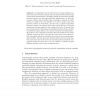Free Online Productivity Tools
i2Speak
i2Symbol
i2OCR
iTex2Img
iWeb2Print
iWeb2Shot
i2Type
iPdf2Split
iPdf2Merge
i2Bopomofo
i2Arabic
i2Style
i2Image
i2PDF
iLatex2Rtf
Sci2ools
114
click to vote
CRYPTO
2003
Springer
2003
Springer
Universal Composition with Joint State
Abstract. Cryptographic systems often involve running multiple concurrent instances of some protocol, where the instances have some amount of joint state and randomness. (Examples include systems where multiple protocol instances use the same public-key infrastructure, or the same common reference string.) Rather than attempting to analyze the entire system as a single unit, we would like to be able to analyze each such protocol instance as stand-alone, and then use a general composition theorem to deduce the security of the entire system. However, no known composition theorem applies in this setting, since they all assume that the composed protocol instances have disjoint internal states, and that the internal random choices in the various executions are independent. We propose a new composition operation that can handle the case where different components have some amount of joint state and randomness, and demonstrate sufficient conditions for when the new operation preserves securi...
Related Content
| Added | 06 Jul 2010 |
| Updated | 06 Jul 2010 |
| Type | Conference |
| Year | 2003 |
| Where | CRYPTO |
| Authors | Ran Canetti, Tal Rabin |
Comments (0)

